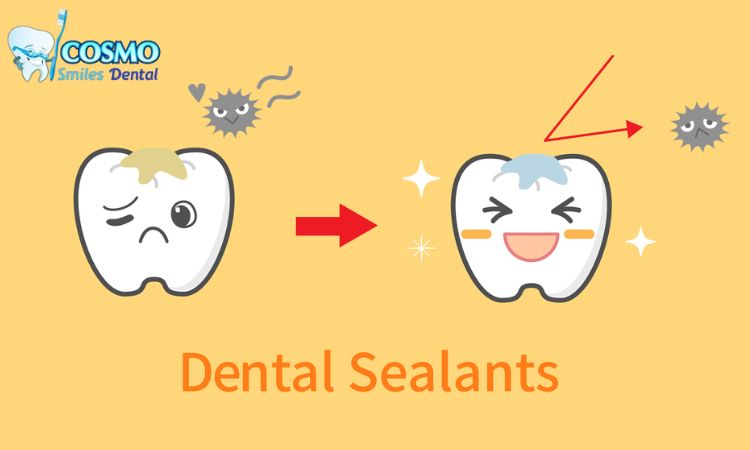Your Guide to Tooth Sealants in Arlington
A healthy smile is a beautiful smile, and preventative care is the cornerstone of lifelong dental wellness. While brushing and flossing are essential, some areas of your teeth are difficult to clean effectively. This is where dental sealants come in, offering a simple and powerful layer of protection against cavities. At Cosmos Smiles Dental, we are dedicated to helping our Arlington community maintain optimal oral health, and sealants are one of the most effective tools in our preventative care toolkit.
This guide will walk you through everything you need to know about tooth sealants, from what they are to how they can protect your family’s smiles.
What Are Dental Sealants?
Dental sealants are thin, protective coatings made from a plastic material. They are painted onto the chewing surfaces of the back teeth—the molars and premolars. These teeth have natural pits and fissures (grooves) that are prime spots for food particles and plaque to accumulate. Even with diligent brushing, toothbrush bristles often can’t reach all the way into these deep depressions, creating an ideal environment for decay-causing bacteria to thrive.
Sealants act as a physical barrier, “sealing out” plaque and food. They create a smooth, easy-to-clean surface, effectively preventing cavities from forming in these vulnerable areas.
Why Are Sealants Used?
The primary reason for using dental sealants is to prevent tooth decay, also known as cavities. According to the Centers for Disease Control and Prevention (CDC), sealants can prevent up to 80% of cavities in the back teeth, where 9 in 10 cavities occur. By applying sealants, we proactively protect teeth from damage, which helps avoid the need for more extensive and costly treatments like fillings or crowns down the road. It’s a simple, non-invasive treatment that offers significant long-term benefits for your oral health.
Who Should Get Dental Sealants?
While often associated with pediatric dentistry, sealants are beneficial for patients of all ages.
- Children and Teenagers: The most common time to apply sealants is shortly after the permanent molars and premolars erupt. This usually happens between the ages of 6 and 14. Sealing these teeth as soon as possible protects them during the cavity-prone years.
- Adults: Adults who have deep grooves or depressions in their molars and do not have fillings or decay can also benefit greatly from sealants. Anyone looking for an extra layer of protection against cavities is a potential candidate.
At Cosmos Smiles Dental, we will assess your or your child’s teeth to determine if you are a good candidate for dental sealants.
What Is the Procedure Like?
Getting dental sealants is a quick, easy, and completely painless procedure. There are no drills and no numbing required. The entire process only takes a few minutes per tooth.
- Cleaning: First, the tooth is thoroughly cleaned and dried.
- Preparation: A special gel is applied to the tooth surface for a few seconds to lightly etch it. This helps the sealant bond securely to the tooth.
- Rinsing and Drying: The gel is rinsed off, and the tooth is dried again.
- Application: The sealant material is carefully painted onto the enamel, covering the deep grooves.
- Curing: A special blue light is used to harden, or cure, the sealant, bonding it firmly to the tooth in a matter of seconds.
And that’s it! The sealed tooth is now protected and ready for use immediately.
Do Kids Mind Getting Dental Sealants?
Not at all! Most children find the process easy and comfortable. Since there are no needles or drills involved, it’s a non-intimidating experience. Our friendly team at Cosmos Smiles Dental is experienced in working with children and ensures they feel safe and relaxed throughout their visit. We explain the process using simple terms, often referring to it as “painting a superhero shield” on their teeth.
What Does It Feel Like After They Are Placed?
Once the sealant is applied and hardened, you won’t feel much of a difference. You may notice the smooth surface with your tongue, but it won’t interfere with your bite or chewing. The material is very thin and blends seamlessly with your natural tooth structure. You can eat and drink normally right after your appointment.
Do Dental Sealants Really Make a Difference?
Absolutely. The evidence supporting the effectiveness of dental sealants is overwhelming. By preventing food and plaque from getting trapped in the molar grooves, they significantly reduce the risk of decay. This preventative measure helps maintain the natural structure of your teeth, saving you time, discomfort, and money that would otherwise be spent on restorative procedures. Think of it as a small investment that pays huge dividends for your long-term oral health.
How Often Do They Need to Be Replaced?
Dental sealants are very durable and can last for up to 10 years with proper care. However, they can sometimes chip or wear down. During your regular dental check-ups at Cosmos Smiles Dental, we will examine the condition of your sealants to ensure they are still providing full protection. If a sealant is worn or damaged, it can be easily repaired or replaced.
Where Can I Get Tooth Sealants in Arlington?
For exceptional preventative care and tooth sealants in Arlington, look no further than Cosmos Smiles Dental. Our dedicated team is committed to providing personalized, high-quality dental services in a comfortable and welcoming environment. We believe in the power of prevention and are here to help your family achieve and maintain healthy, beautiful smiles for years to come.
Dental sealants protect the depressions and grooves of your teeth from food particles and plaque that brushing and flossing can’t reach. Both children and adults can benefit from this simple treatment in the fight against tooth decay.
Schedule Your Appointment Today!
Protect your smile with dental sealants from your trusted Arlington dentist. Contact Cosmos Smiles Dental today to schedule an appointment for you or your child.
Call us to book your visit!
